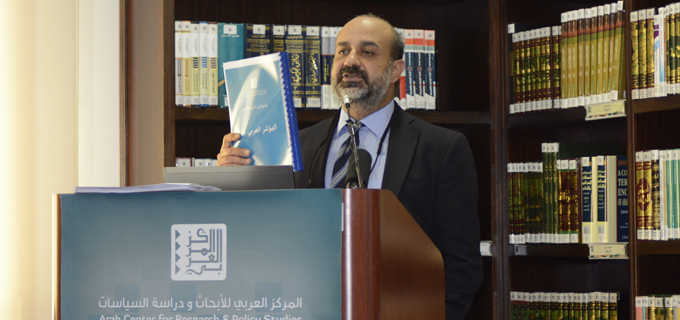The Doha-based Arab Center for Research and Policy Studies announced the results of the 2014 Arab Opinion Index, the Center’s third annual survey of Arab public opinion, in a press conference on the morning of Wednesday, 24 September. The Arab Opinion Unit within the ACRPS will use the press conference to highlight how opinion across the Arab countries has shifted in tandem with the massive changes which have taken place over the past 12 months.
 |
| Dr. Almasri offers journalists detailed findings from the 2014 Arab Opinion Index at the press conference held at the ACRPS headquarters on Wednesday, September 24. |
Isra Batayneh, a Researcher within the Public Opinion Unit, points out that developments over the last year will have had a major impact on respondents’ perceptions of democracy, governance, and the impact of the Arab Spring. The questionnaire which forms part of the Index, added Batayneh, also included questions on respondents’ attitudes towards the policies pursued by China, France, Iran, Russia and the United States in the Arab region.
This year's findings were based on the face-to-face interviews carried out with the a total of 26,618 respondents. These included 21,152 respondents spread across 14 Arab countries: Yemen, Saudi Arabia, Kuwait Iraq, Jordan, Palestine, Lebanon, Egypt, Sudan, Libya, Algeria, Tunisia, Morocco and Mauritania. In addition, this year's survey covered Syrian Refugees and Internally Displaced Persons spread across refugee camps in Jordan, Lebanon and Turkey, and across the Syrian-Turkish frontier (for the IDPs).
Respondents to the survey answered questions related to their own livelihood and general wellbeing; the economic circumstnaces in which they and their families live; the political and economic situations of the respondents' home countries. In addition, the survey sought to determine respondents' attitudes towards democracy as compared to other forms of government; to religion and its role in the public sphere; to questions of inter-Arab cooperation; and the Arab Spring and its chances for success.
As with previous years, results from the 2014 Arab Opinion Index show widespread support for the Palestinian cause in particular, as well as a consequent antipathy towards Israel. The results also demonstrate a broad level of sympathy with the Syrian revolution, and a desire to see Bashar al Assad removed from power. They also demonstrate, however, some more recent confusion attendant to the Arab Spring: opinions surrounding Mohammed Morsi, the deposed President of Egypt elected following the January 25, 2011 revolution is divided fairly evenly among the Arab public while instability and a lack of safety and security have been clearly felt. Arab citizens' sentiment towards the Arab Spring, however, remains robustly optimistic in general, with more than 60% believing that the revolutions will succeed in achieving their aims.
To read/download a PDF version of detailed highlights from the 2014 Arab Opinion Index, please click here.
Journalists looking for further details, please send an email to: media@dohainstitute.org